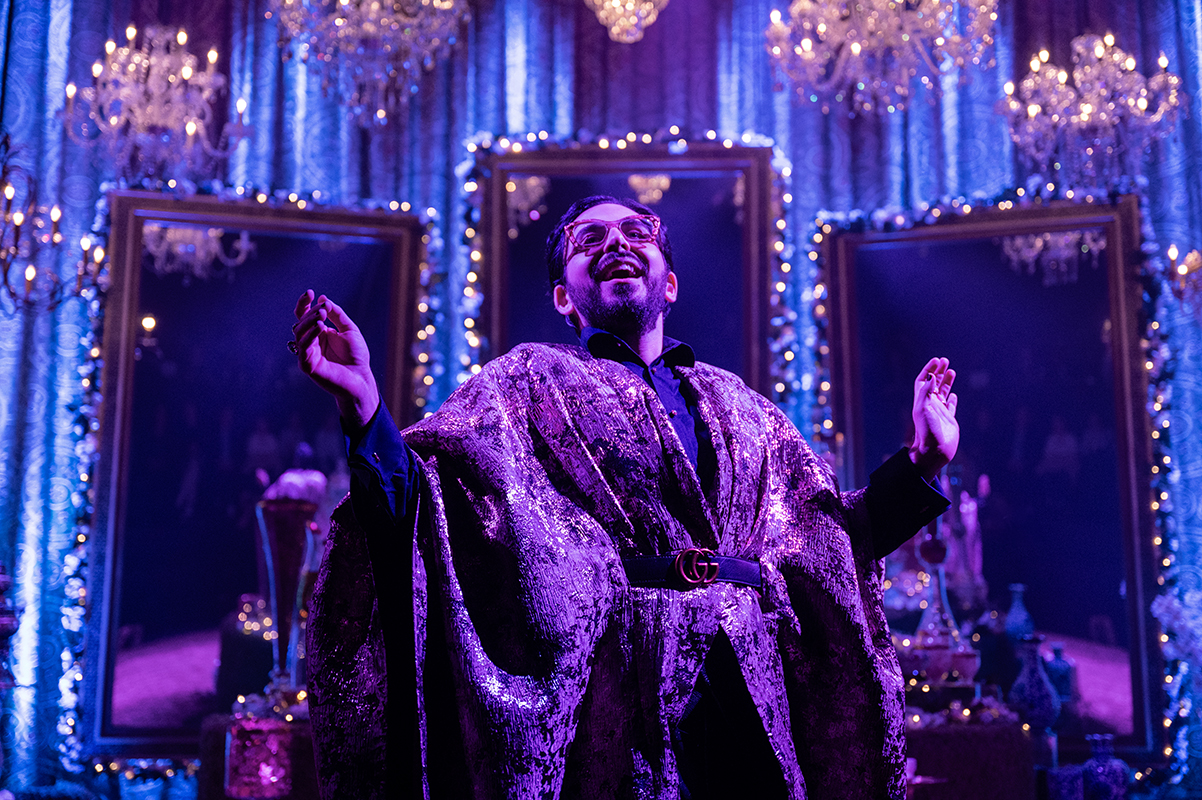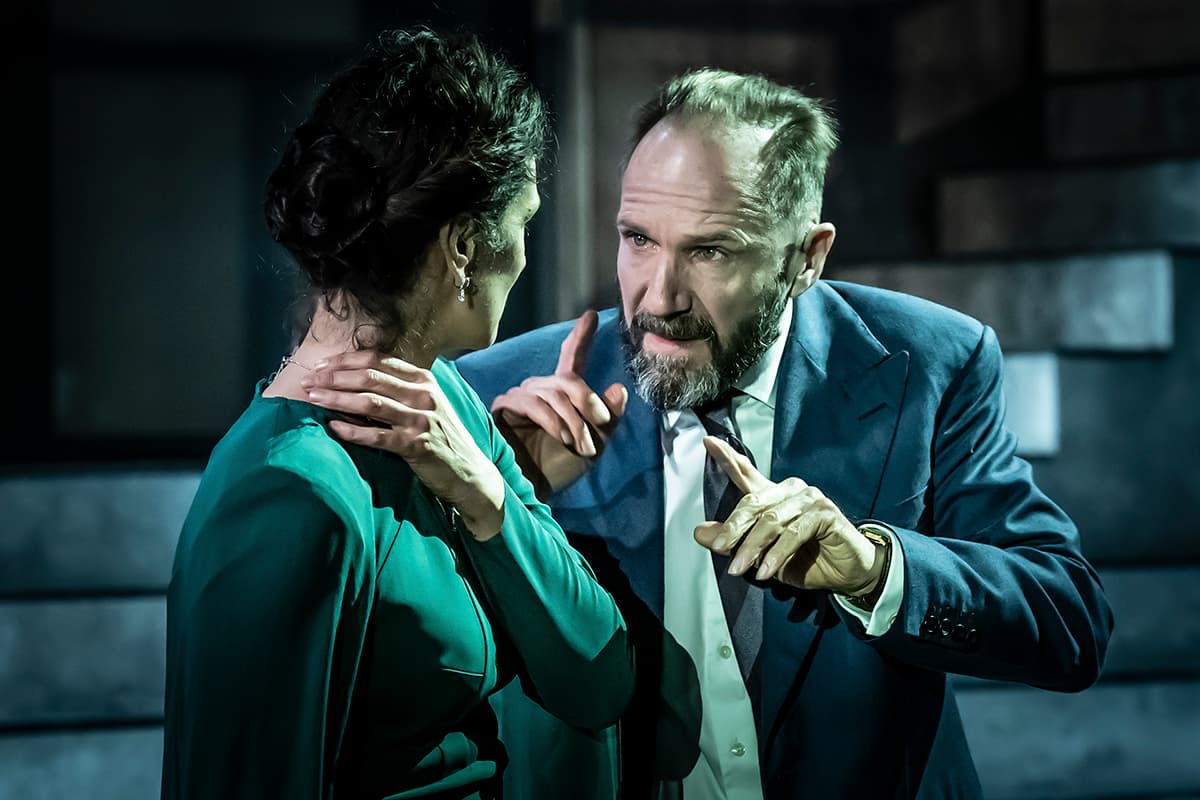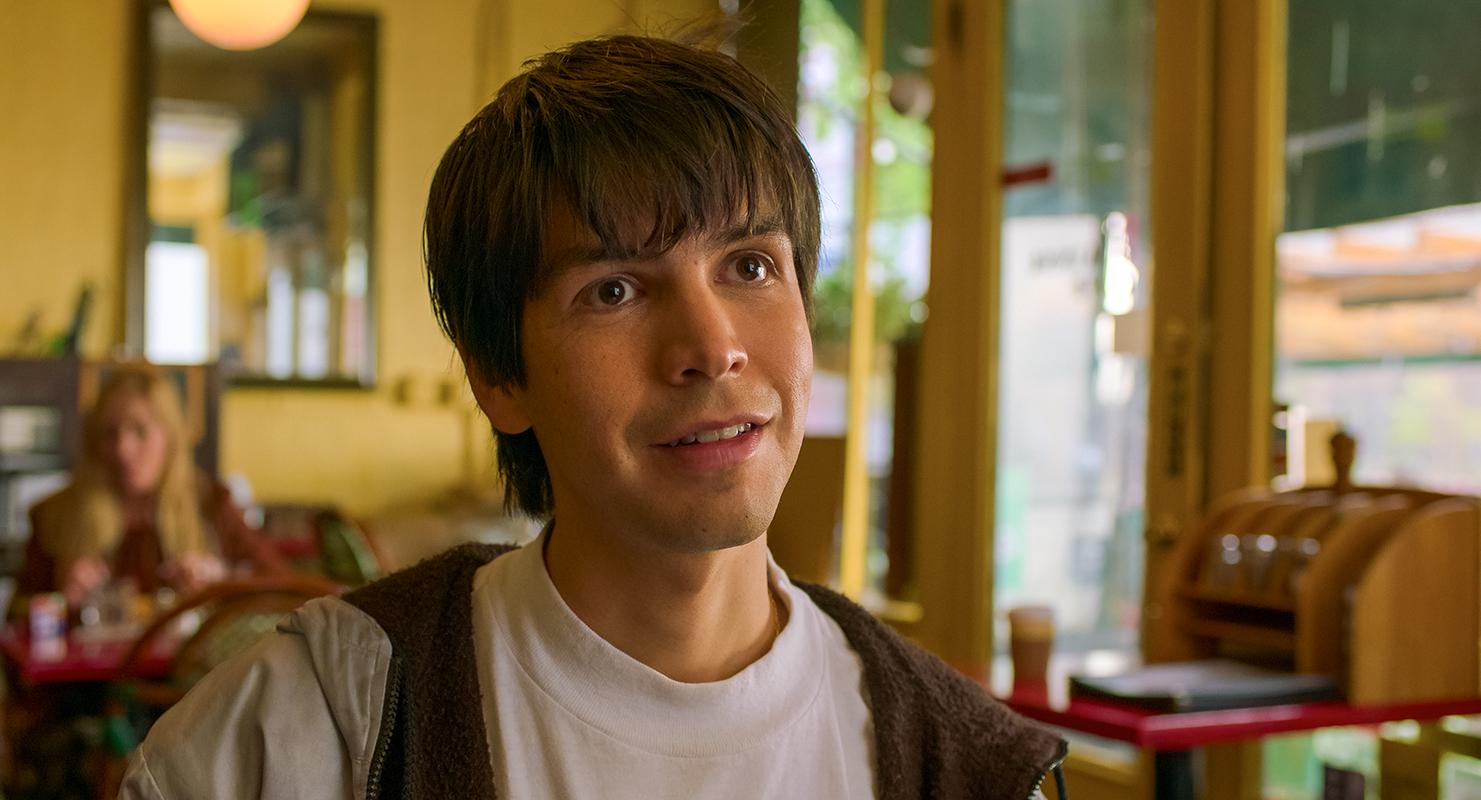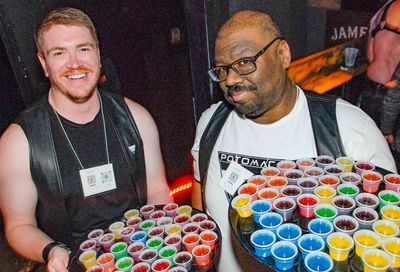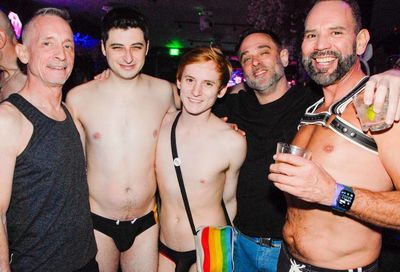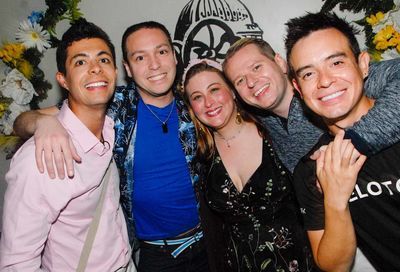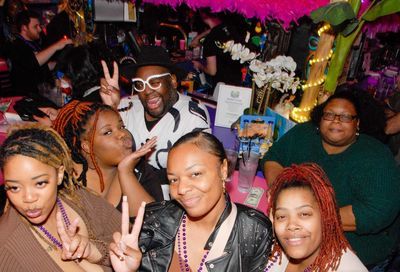Boys in the Bard: An interview with Hamlet’s Michael Urie & Ryan Spahn
Michael Urie and Ryan Spahn talk candidly about their nine-year relationship and the challenges of being out in Hollywood

Michael Urie still gets asked to audition.
Despite his recognizability, despite his fame from four seasons playing the flamboyant, scheming Michael St. James on Ugly Betty, every so often, the actor has to through the rigors of a bona fide audition.
“Occasionally,” says the tall, handsome actor, who at 37 remains impossibly youthful. “Not very often. Not because I wouldn’t. Not because I refuse to audition. The good news is when I audition for something, I’m usually in the running. If I’m being asked to audition for something, it’s because I’m a consideration ‘for reals,’ as opposed to one of many. I’m in the mix, as they say. Or…”
Or?
“Or they’re making sure I’m not an asshole.”
He’s not, rest assured. In fact, Michael Urie is one of the most unpretentious celebrities you’re likely to meet. He’s friendly, warm, playful, infinitely forthcoming. And he’s blessed with the kind of star presence that makes you understand instantly why Michael Kahn thought he would make a perfect Hamlet.
Urie’s partner, meanwhile, Ryan Spahn, also 37, may not be at the same level of national recognizability, but he’s had an extraordinary career all his own, mostly on stage. The disparity between the levels of their careers is something the couple addresses frankly and it’s this self-awareness that powers a strong, clearly loving nine-and-a-half-year relationship.
Spahn, who matches Urie’s warmth and good looks, comes off in conversation as the more serious of the two. But get them goofing around with a skull for a photographer, and all bets are off as they fight to upstage one another, in what can only be called a supreme battle of facial wits.
Hamlet is the first play they’ve acted in together — though in 2013 they made a film, He’s Way More Famous Than You, directed by Urie and written by Spahn and Halley Feiffer. “It recently became available on Amazon Prime,” says Spahn of the comedy. “Out of the blue.”
“I directed Hamlet for Michael,” says Kahn, the storied artistic director of The Shakespeare Theatre Company, who is departing his post after next season. “The theater wanted me to do another Shakespeare before I leave and I thought, ‘Well, if Michael will do Hamlet, then I will do one more.'”
Kahn had wanted Spahn in last spring’s The School for Lies, but scheduling conflicts intruded. So when he offered the role of the Danish prince to Urie, he envisioned Spahn as part of the deal, offering the role of Rosencrantz, Hamlet’s university friend-turned-betrayer. “Ryan is a wonderful actor, wonderful actor,” says Kahn. “He’s so smart, and there is such intelligence and variety in his work.”
As for Urie, Kahn says, “I can tell what Michael is thinking on stage, and that incredible warmth and appeal that he has, in addition to his intelligence, in addition to his comic ability, and my knowing that he can handle language in his own way, he was absolutely the right person to play Hamlet.”
In fact, Urie brings a unique, vibrant interpretation to an all-too-familiar role, one done to death by nearly every major actor imaginable. Urie’s is an energized, virtuoso performance that exhibits the actor’s powerful dramatic range, while tapping into his nimble comic instincts. There’s nothing that rings false about this Hamlet — he’s as genuine as they come. “He may be tortured, but he is also funny, adorably flappable, entertainingly clever and ever vulnerable, even as he rails,” wrote Metro Weekly‘s theater critic, Kate Wingfield. “He is an awkward young man full of charm, life, and ridiculous opinions, and you want him around.”
The experience of working with Urie and Spahn, says Kahn, “was everything and more than I expected. I’m completely thrilled with the results.” The pair are equally enamoured with their former professor, Kahn, with whom they also share a longtime friendship. They tell bright, buoyant stories of his directing style, punctuating with affectionate imitation of Kahn’s distinctively low, gravel-stoked voice.
Sitting in the Patron’s Lounge of Harman Hall last Friday, their dog Kinley, a spry Chihuahua/Boston Terrier mix, in tow, the couple sat for a wide-ranging talk about their relationship, their careers, Hollywood’s purge of those who abuse power as well as its mistreatment of LGBTQ actors, and the intoxicating joys of acting Shakespeare.
The rest, as they say, is silence.
METRO WEEKLY: How did you meet?
MICHAEL URIE: The first time we met was at a mutual friend’s karaoke birthday party — James Ginty was my classmate at Juilliard and Ryan’s classmate at Interlochen High School.
RYAN SPAHN: Interlochen Arts Academy. This was like the summer or spring of 2003, probably.
MICHAEL: That we first met? No, no, no. This was, like, 2007. Because I had just moved to L.A. for Ugly Betty.
RYAN: No. Ugly Betty hadn’t started.
MICHAEL: It had just started. We were shooting.
RYAN: We obviously have no idea. [Laughs.]
MICHAEL: Basically, we were at this party, and I liked the look of him. Ryan didn’t even notice me. But James set us up and we talked on the phone, and we were to have a date and –
RYAN: Oh, this is how we can know the date. We were supposed to go see the tour of Doubt with Cherry Jones.
MICHAEL: So it was 2006.
RYAN: And he canceled.
MICHAEL: I canceled because my friend died, which was a perfectly reasonable excuse.
RYAN: Sure.
MICHAEL: But because Ryan has no heart, he didn’t accept that excuse. I didn’t reschedule. Ugly Betty started and I was on TV and my life changed entirely. Being single was fun, and I didn’t really follow up with Ryan.

MW: Ryan, were you annoyed the date didn’t happen?
RYAN: I had been in a period in my life with dating where I was like, “Oh, of course he canceled.” It was one of those kind of moments where if this were a romantic comedy about my life, that’s the phone call I’d get after a series of terrible dates.
MICHAEL: My friend died!
RYAN: So then, I was just not that interested. And because he became more well-known, I was worried that I was now aware of him because of who he is and he wouldn’t be aware of me because I wasn’t on television. The playing field wasn’t even anymore. That’s how I felt.
MW: You didn’t reschedule. So what happened next?
MICHAEL: A year later, I was playing Horatio in Hamlet at South Coast Rep and Brooke Bloom, who was playing Ophelia, said, “My friend’s coming to see the play tonight. Apparently you were set up on a date once and it didn’t happen.” And I said, “What? Who?” And she explained, and I said, “Oh, I want to meet him!” And she said, “He doesn’t want to meet you.” And that disappointed me, but I understood. And then a year after that, they moved Ugly Betty to New York. And Brooke and Ryan also moved to New York.
I’m hanging out with Brooke, and she says, “Guess who lives here now,” and I said, “Oh, can we please finally do this?” My life had settled down. I didn’t feel so crazy. I thought maybe I could really date somebody and not just date around. And he still wasn’t interested in meeting me. Finally Brooke made plans with both of us on the same day but she broke her shoe and had to go to a cobbler. So she was late arriving.
MW: This is literally a romcom.
RYAN: I arrived early and you were still waiting.
MICHAEL: And we ended up alone for a while —
RYAN: — at this bar –
MICHAEL: — and we hit off.
RYAN: That’s nine and a half years ago now.
MICHAEL: We hit it off right away, and then Brooke showed up and we hung out with her. And then she left, and we kept hanging out. Then later, we got refused service at that same bar for being too affectionate with each other.
RYAN: We got asked to leave because we were gay.
MICHAEL: Well, they didn’t ask us to leave but basically threatened to cut us off.
RYAN: They said that we were being rowdy.
MICHAEL: Which was so not true.
MW: How affectionate were you?
MICHAEL: Like this maybe. [Holds Ryan’s hand and leans on him.]
RYAN: Like leaning on each other. Touching a little bit. Barely touching.
MW: How did that make you feel?
MICHAEL: Really angry.
RYAN: You were so angry.
MICHAEL: It had never happened before, and it’s never happened since.

MW: But that date clearly sparked the relationship.
MICHAEL: Yeah. We were all-in right away. It was very nesty.
RYAN: We moved in together probably –
MICHAEL: Six months later.
RYAN: Have lived in that same apartment for nine years now in New York.
MW: It almost sounds like you were fated for one another, but not quite ready for each other, so fate held you apart for a few years.
MICHAEL: I think that that’s true. We were both going through major changes in our life when we first met. I was suddenly on TV and the show was an out-of-the-gate hit. I was getting recognized in the grocery store line. People were turning around and saying “Is this you?” with magazines in their hands. If we had started dating then, I don’t see how I would’ve been interested in a commitment because of where my life was. And then fate took us both to New York. We had no idea they would move Ugly Betty to New York. That was unprecedented.
RYAN: We need to thank that person who made Brooke’s shoe, for making it poorly. That’s who we’ve got to track down.
MW: You’re both working in the same field. You’re both the same age. You both could go after the same parts, essentially. How do you deal with that in your relationship?
RYAN: Well, we don’t. Because he’s in a different place in his career. He’s had so much exposure to –
MW: But you’re very recognizable. I don’t know why. I know your face.
MICHAEL: [Whispers.] He’s been in a lot of commercials. Sony PlayStation. He did a Snickers commercial with Patrick Ewing that was really popular.
RYAN: His life has populated him with the television world, and I have not had that exposure, so we don’t go out for the same things.
MW: No rivalry?
RYAN: No, because people who want Michael Urie, I’m not the kind of actor they’re gonna be looking for if Michael can’t do it. We’re very different. We don’t bring the same thing to a role.
MICHAEL: There were a couple of times early on where something would come up for me, I wouldn’t be able to do it, and I would recommend Ryan.
RYAN: Because he’s so kind and he wants to help as much as he can. But it got to the point where –
MICHAEL: — it was uncomfortable. It wasn’t the right kind of help.
RYAN: I was like, “You don’t need to recommend me because if they want you, they don’t want me.” So now we’re going into these situations where I feel like I’m almost a favor to the person who is asked by Michael to meet me.
MICHAEL: I don’t think that ever worked. I tried it a few times and it never worked. It was awkward.
MW: But you’re supportive of each other’s careers.
MICHAEL: Oh, absolutely. We’re much better when we’re both working. We’re much happier when we have jobs, or when we have jobs on the horizon. If either of us are in limbo with work, that’s when it’s tough. Because there’s an uncertainty.
RYAN: Not that our happiness depends on it, but we’re just happier when we’re working because we’re being utilized. We’re doing what we love, and I think there’s a sadness for the other one if they’re not able to do that.
MICHAEL: This business is so fickle — and it’s so painful. Even when it’s going well, there’s so many pricks. I don’t mean people that are pricks. I mean, like –
RYAN: There’s that, too.
MICHAEL: — the “thousand natural shocks that flesh is heir to,” like Hamlet says? There’s so many of those even when you’re flush, so many things that are tricky and annoying and frustrating. There’s enough of those on your own with your own career as an actor in show business, but there’s both of us. He feels my pain and rejection and I feel his. But on the other hand, we feel each other’s successes.
RYAN: I think it’s also helpful that we deal with it emotionally, differently. [Turns to Michael.] You tend to get more outward and frustrated and emotional when things are hard for you and I tend to shut down and get introverted. So we’re able to provide something different for each other.

MW: Are you married?
MICHAEL: We’re not married.
RYAN: We’ve thought about it.
MW: After nine years, why are you not married?
RYAN & MICHAEL: There’s not really a good answer.
MW: You’re speaking at the same time. The exact same words. You might as well be married.
MICHAEL: It just didn’t feel important to us.
RYAN: I think if it’s necessary for you, then you should do it, but I don’t know if it’s a necessary part of any relationship.
MICHAEL: It’s necessary that it be legal, for sure. And it’s necessary that we have the option. The same way that it’s necessary that a woman has the option to do with her body what she deems necessary. Doesn’t mean she has to.
RYAN: My parents are divorced. And just the thought of putting a wedding together sounds like a nightmare. Planning a wedding is the last thing I want to think about.
MICHAEL: We’ll probably just go to the courthouse one day and do it and just surprise everybody. Or not even tell anybody.
RYAN: Yeah.
MICHAEL: We marched. We fought. We wanted marriage equality and we absolutely believe in that, of course, and will fight for it again if we have to, but for us —
RYAN: There’s not an urge. There wasn’t a possibility in my mind growing up.
MICHAEL: That was never a seed.
MW: Do you feel you have a good relationship? How do you keep it strong?
MICHAEL: I think so.
RYAN: Our careers help with that because we’re constantly pulled away from each other. You know, if a job takes one of us away for a period of weeks, it’s great. The act of pining for somebody is important for romance, and I think that that happens when you have a job that pulls you away from each other at times. You need to think about the person so that your heart gets excited to see them. And then you see them, and romance is back.
MW: The act of pining. I love that.
RYAN: I think it’s important. I think that’s what can get lost when people are just on top of each other all of the time.
MICHAEL: And as hard as it can be, sometimes being with an actor, like I said, our rejection is mutual. When I have something horrible happen, he feels it, and vice versa. I think that helps to balance it — that we can go off and be our own people.
MW: What is it like when you are working together on something like Hamlet? What does that bring to you in terms of your relationship and career?
MICHAEL: I’m playing Hamlet, which is so taxing and so exhausting — and that’s not to say that Rosencrantz is not also an exhausting role. During rehearsals, I had to remind him sometimes that it was okay for him to be tired, because I’ve had more work to do. If I’m not on stage, I’m practicing fighting. If I’m not fighting, I’m learning lines. He basically was off book the first week and didn’t have to go to fight rehearsals and had this giant chunk of time when he wasn’t even called. He had actual days off from rehearsal. I never had that.
So I can’t imagine doing this without him, because he took care of me. He went grocery shopping. He walked the dog. He let me sleep in or let me get up early and go to the gym or he allowed me to really take care of myself in a way that if I had been here alone, without him, without the dog, I would’ve felt a lot of pressure. I would’ve felt alone. I probably would’ve gotten a lot of takeout. I wouldn’t have been able to take care of myself the way that he took care of me. So in that respect it’s been really great.
MW: How is it working at the Shakespeare?
MICHAEL: It’s a really cool place to work.
RYAN: It’s the best. First off, we have such an amazing history with Michael Kahn, both separately and together. We both went to Juilliard, which he taught at, but Michael went when he was actually on faculty and I went when he was a guest director/teacher.
MICHAEL: We both connected with him pretty strongly.
RYAN: We would go on double dates with him and his husband, and so for years he’d been coming to our shows and was having dinners with us. Over time, he’s tried to bring us to the theater. I was supposed to do something last year, but couldn’t, so when this came about, it was a nice opportunity to come here.
MICHAEL: He came to see me in a play about a year and a half ago. Afterwards, in the lobby, he said, “Will you come play Hamlet? We’ll bring Ryan, too.” I said yes right then and there. It was a no-brainer. I think he had been disappointed to lose Ryan in that other play and really genuinely wanted to work with him.
I had always wanted to do Hamlet for him. I always wanted to play Hamlet, and I can think of no better way than to play it than at this theater that has such history, such an incredible audience, and such resources. To play Hamlet at all is great. To play Hamlet in a production like this that has such nice everything — well, they know how to make Shakespeare plays here.
MW: Michael, your interpretation of the role is different from what we’re used to. Instead of a perpetually broody Hamlet, we’re getting a more antic Hamlet. It’s in the way you move your limbs. The way you position yourself. Our critic likened it to the way a teenager acts things out. You’re also bringing a fair amount of humor to the role, quite effectively.
MICHAEL: I’ve heard that some people think the portrayal is wrong. But other people say “Oh my gosh, that’s what it should be” and “I never thought of it like that.” It’s puzzling to me because I never realized how strongly people felt specifically about the way Hamlet should be played, because so many different people have played it. The physical stuff, it was not intentional — it’s just the way it comes out. But the idea that Hamlet shouldn’t be funny is puzzling to me because when I think about the [Kenneth] Branagh version, obviously it’s not a comedy, but I remember Branagh being funny. I think about Kevin Kline doing it. I’ve seen that on video, and he’s funny. And when I played Horatio, Hamish Linklater was Hamlet and he was funny. So the idea that Hamlet can’t be funny is stupid. Just stupid. He is funny. He’s funny. He actually makes jokes. I can point them out.
RYAN: Very depressed people can be very funny as well. They’re not just one thing.
MICHAEL: The idea that any actor who plays Hamlet would not bring themselves to the role and not use themselves is foolish because Hamlet has to go through so many things. It’s one thing to put on a fat suit and spend three hours in makeup and be a totally different character. That’s very cool, that’s very exciting, and bully if you can do that. But if you’re playing Hamlet and you have to go through the things Hamlet has to go through — which really is everything — then to not use yourself is totally silly. Because what other character can you play besides a version of yourself that can go through all of those things? I’ve not gone through all those things that Hamlet has gone through, but why would I try to be a different person who has? I should be myself and imagine what it would be like if I went through all those things. And that’s how it comes out.
Michael Kahn and I sat down and looked at the text, and he said, “In this scene, he is upset because of this and in this scene he is angry because of this.” How does Hamlet go from being sad to being angry so quickly? You have to make that leap. He doesn’t brood the entire time. He’s not sinister. He’s not always sly. Somehow people have in their head that Hamlet is always brooding and sad.
MW: What’s it like being directed by Michael Kahn?
RYAN: I think for us it was a different experience because of our history with him. We had such a relationship to him already, it’s just a thrill. I also think it’s fun to also be in a show with people who have varying levels of career. There’s generation to generation, up to Keith Baxter [Ghost, Gravedigger, Player King], who’s 85 years old and has worked with Orson Welles, to somebody who’s getting their equity card on this show. So just that wealth of experience in one room made the whole experience very exciting because people were constantly looking up to the person more experienced than them for clues and guidance and insight.
MICHAEL: Michael Kahn is good that way — he brings a little bit of everybody into the cast. He likes the room to be –
RYAN: Buoyant. And he has bursts. He’s sort of Hamlet-y. He has bursts of hyperactive excitement and joy, and then moments where you’re like, “Don’t look him in the eye or he’ll chop off your head!”
MICHAEL: You’ll turn to stone.
RYAN: It’s so extreme.
MICHAEL: Sometimes you’ll think he’s really furious and realize no, he’s not.
RYAN: And then he’ll apologize: “Oh, I’m sorry, sorry, sorry. I’m just excited.”
MICHAEL: When I auditioned for Juilliard, I remember at the end they said, “Do you have any questions?” And I said, “Yes. What is it that you like about Juilliard?” And Michael said, “I like that when the students get out of Juilliard they are ready to come work for me.”
Granted, he knows my training and he knows my experience and he knows the work I’ve done — he had very high expectations — and he doesn’t move slowly. He moves very quickly and he expects you to be with him. He sets the pace and you stay with it and it’s very exciting. It means you have to do a lot of work on your own. You have to be really prepared and you have to be really awake and alive and focused and ready to start when he’s ready to start.
One of the things I think that makes his directing of Shakespeare so clear and so easily accessible is that he knows everything about verse and everything about Shakespeare, and he insists that everyone speak it as clearly as possible. But he’s also so keen on reactions. I have the bulk of the dialogue in certain scenes, but he will also be very focused and diligent with the person doing the listening.

MW: You both have acting experience in Hollywood. Can either of you comment on what’s happening in the industry these days with regard to sexual harrasment?
RYAN: I’ve never encountered any direct behavior like what’s being talked about, but I do feel that being someone who’s an out actor, there’s a lot of difficulty just being in the business with how people treat you, the assumptions that are made about you, and the behavior towards people who are gay — which, to me, falls under the same umbrella of people just not having equal power in situations and people using their power over others. That is something of tremendous importance in the entertainment industry — that people not use power as a way of controlling others. I think that’s the only way I’ve experienced it, because my sexuality is known — it’s used against me.
MW: Do you think it’s held back your career?
RYAN: It absolutely has, because I don’t get called in for roles that don’t have the word gay written in the bio. You get these breakdowns, which describe what people are looking for with castings, and if it doesn’t say gay, I’m most likely not called in. And very often these days, people are very interested in seeing heterosexual men play gay roles. So that category is becoming less and less populated by gay people.
MW: Does that bother you?
RYAN: Yeah, it bothers me. It’s extremely upsetting and unfair and small-minded of the people who are in control of setting up appointments.
MICHAEL: I think it’s also more systemic. Because it can always be argued that, “Yes, the actor that’s playing the gay character in this film or TV show or play is heterosexual, but we chose the best actor for the role” — and you can’t disagree with that. You can’t say “No, you didn’t,” because you don’t know who they saw. Are they considering an appropriate cross section of people for the roles? Is the most truthful, the most honest, the most qualified person to tell the story of a gay person in love a straight person? Is that possible? Maybe it is. But did you really see the best actor for the role or did you just choose the best actor that was brought to you?
I have seen people be treated poorly because of power, sometimes sexually, and there have been times when I have stepped up and there have been times when I’ve seen it happen and not done anything and regretted it.
MW: What types of things?
MICHAEL: I don’t want to give examples, because I think again that there are systemic problems that lead to people being treated unfairly or people being treated in a sexist way. The few examples I’m thinking of specifically are women who’ve been mistreated by men for misogynistic reasons or for ignorant reasons.
MW: Not necessarily sexual harassment.
MICHAEL: Not necessarily sexual harassment but misogyny. I hope the #MeToo movement destroys the predators. We must remove all these horrible predators. And then as the tiers of misconduct become clearer, that the movement enacts change. Because it’s not just about the predators, it’s about how society treats –
RYAN: It’s about people behaving as if their life or their power has more value than yours.
MICHAEL: Yeah. And in show business we can lose jobs for not playing along. Not just sexually, but laughing at a joke that a superior makes or smiling or –
RYAN: Being perceived as difficult.
MICHAEL: Yes, being perceived as difficult — if you don’t play ball. Which doesn’t necessarily mean having sex with somebody or letting somebody leer at you or letting somebody grab your butt. There are many, many tiers, and I hope that what the #MeToo movement does after it clears out all the predators is that it makes, at least, show business, and hopefully all of society, treat each other with respect, no matter what position you’re in. Then it can then really become about what the work is and not about power playing.
MW: Have you had trouble in your career being out, Michael?
MICHAEL: No, it’s only helped me.
RYAN: You also came out after your success.
MICHAEL: I came out while I was on TV playing a gay guy. No one was gonna hire me for straight roles anyway — I wasn’t really getting straight roles before Ugly Betty. Before Ugly Betty, I had only done one other pilot and that was a gay guy and that was all I was really being considered for.

MW: Why do you think that is?
MICHAEL: Because people can smell it, I guess. [Laughs.] When it’s a story about a man falling in love with a woman, I understand why I might not be the best person for the job, in the same way that when it’s a story about a man falling in love with a man, it’s hard to believe that there isn’t, somewhere, a man that actually has been through that that couldn’t play the role.
RYAN: There’s an assumption, I think, that gay people are limited. The business has accepted it and lifted that opinion up in a way that’s pretty awful.
MICHAEL: When Ugly Betty ended — and the show went out on a high note, we were canceled, but we were doing well, we were still relevant, it was foolish of them to cancel the show — there was buzz in the industry that because it was right around pilot season, we were all gonna get scooped up in the best pilots. I remember hearing that, reading that in the trades, and calling my agent, and being like, “Oooh, I’m so excited! What am I gonna get?” And there was nothing. There was nothing for me. At all. And the other cast-members were getting picked up.
My cohort on the show, Becki Newton, who’s this genius comedian — beautiful, blonde, brilliant funny person — she was getting tons of offers. Essentially on Ugly Betty, we had been doing the same thing. We were Frick and Frack, these funny idiots who are best friends, two sides of one coin. And when the show ended, suddenly there were so many pilots for her and literally none for me. I mean, I worked — I got jobs in the theater. But there was an idea that the only thing I could do was the guy in Ugly Betty, and “We don’t want that in anything else, and if we did have that character somewhere else, we don’t want him to do it. We want someone new to do it.”
To be honest, I didn’t want to play that character again. And if somebody had offered me that character again, I would not have taken it because I didn’t want to just be that character. If I’d gone and done something like that again it would’ve been bad. I feel like I would’ve been pigeonholed.
MW: Still, to get nothing based on the merits of your performance, that can’t feel good obviously.
MICHAEL: It was rough. I mean, you remember.
RYAN: Yeah.
MICHAEL: It was rough.
MW: I want to wrap things up with going back to something stupidly obvious, since this comes out right before Valentine’s Day. Let’s play the Newlywed Game. Michael, what’s the most annoying thing about Ryan?
MICHAEL: Ryan has a tendency to start projects while we’re walking out the door. I’ll be ready to go. My bag is on. My coat is on. My scarf is on. I’m standing at the door waiting, and he’ll start unloading the dishwasher, or he’ll go around and undo things I have done. I’ll close all the windows before we leave, and then he’ll go round and reopen them, and I’m standing at the door, and I’ll say, “Why are you opening the window? I just closed them! We’re leaving the house!”
“No, let the fresh air in.”
“But it’s gonna rain today.”
“But the animals like it when the windows are open.”
“No, they don’t. They hate it.”
And he likes to start projects. He’ll also be like, “I’m just doing this because you were putting on your coat,” and I’m like, “I’m putting on my coat so we could leave, not so that you can start a project!”
RYAN: Mine’s also related to leaving as well, funnily enough.
MICHAEL: I’m not sure that he wanted to ask you that question.
RYAN: He did. I think it stems from because when we go to theater or events, things like that, sometimes he’ll be recognized in the lobby if we’re there early. He likes to push to the last second the time it takes to get somewhere, so that we arrive just as it begins or just as it’s about to start –
MICHAEL: I don’t like waiting in line.
RYAN: And so what happens well over fifty percent of the time is that we are running through Times Square, down the street, frantically. I don’t have time to go to the bathroom, and I’m a compulsive person who goes to the bathroom. We’re sweating and then we arrive, heaving, because we didn’t leave when I had been saying, “Can we leave? Can we leave? Can we leave,” and he’s stretching in the kitchen or something being like, “Just five more minutes.” That drives me crazy.
MW: Anything not related to leaving?
RYAN: His bathroom behavior drives me crazy. I’ll go in to brush my teeth or wash my face, and I’ll try to go so we’re not in there at the same time, and he’ll hear that I’m doing it and come in and lean on the sink, and I’ll have to back up. Or I’ll be going to the bathroom and he’ll be like, “Can I go, too?”
MICHAEL: He hates peeing at the same time. He won’t do a sword fight.
RYAN: Or he’ll [adjust] the showerhead because he’s taller, and then I’ll turn it on and it will spray on the wall and on the floor and then I’ll have to mop it up.
MICHAEL: What?
RYAN: Yes. These are things that you do that I don’t talk to you about.
MICHAEL: What? That’s ridiculous! That’s really silly. It worked. You did it. Now we’re gonna fight.
MW: Okay, so let me bring you out of the fight. Ryan, what do you love most about Michael?
RYAN: That he’s him. His patience, his humor. I think a good relationship is when a person cares more about your happiness than their own. And I can feel that. Anytime I’m around him I’m immediately relaxed, because I feel safe knowing how much he cares about my own happiness, and he’s monitoring that in all its manifestations.
MW: And, Michael, what do you love most about Ryan?
MICHAEL: Given our profession and our relationship and the way that the two of us are in this bizarre business together and the people that we’ve brought into our lives, he never pretends to be somebody he’s not. And I think that that is rare in show business. It makes our life so much easier that he will always be him and he will never pretend to be anything else. The way that he looks at me will always be the same. The way that he sees me. And it calms me down knowing that no matter how crazy I feel, or how weird the people around us end up being, or how awkward a situation we’ll end up in, he will always be the guy I fell in love with.
Hamlet runs to March 4 at Shakespeare Theatre’s Sidney Harman Hall, 610 F Street NW. Tickets are $44 to $125. Call 202-547-1122 or visit shakespearetheatre.org.
Support Metro Weekly’s Journalism
These are challenging times for news organizations. And yet it’s crucial we stay active and provide vital resources and information to both our local readers and the world. So won’t you please take a moment and consider supporting Metro Weekly with a membership? For as little as $5 a month, you can help ensure Metro Weekly magazine and MetroWeekly.com remain free, viable resources as we provide the best, most diverse, culturally-resonant LGBTQ coverage in both the D.C. region and around the world. Memberships come with exclusive perks and discounts, your own personal digital delivery of each week’s magazine (and an archive), access to our Member's Lounge when it launches this fall, and exclusive members-only items like Metro Weekly Membership Mugs and Tote Bags! Check out all our membership levels here and please join us today!




